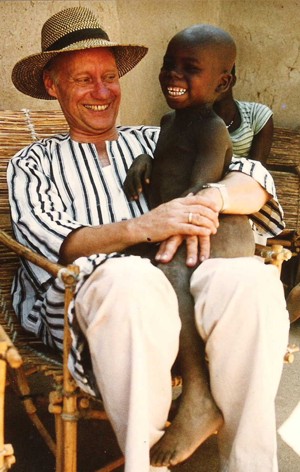Franz Kröger
Prof. Dr. Rüdiger Schott
An Expert and Friend of the Bulsa Has Died
 After a long illness, Prof. Dr. Rüdiger Schott died in Bonn (Germany) on 7 December 2012. He was
born on 10 December 1927 in Bonn and, after studying ethnology as his main subject and
geography, psychology, philosophy, law and religious science as subjects of further interest, he became
the founder and director of the Institute of Ethnology at the University of Münster in 1965.
After a long illness, Prof. Dr. Rüdiger Schott died in Bonn (Germany) on 7 December 2012. He was
born on 10 December 1927 in Bonn and, after studying ethnology as his main subject and
geography, psychology, philosophy, law and religious science as subjects of further interest, he became
the founder and director of the Institute of Ethnology at the University of Münster in 1965.
As his scientific achievements and his detailed curriculum vitae have been published elsewhere
(see links and references below), it will be appropriate here to deal with his research work among and for the Bulsa.
When, in 1966, he left Germany to conduct fieldwork in Northern Ghana, he was not quite sure
whether he should work among the Kusasi or Bulsa. On the boat from Southampton
(England) to Accra, he met
Pastor Byers, who, after a holiday in Britain, was returning to his Presbyterian Mission Station at
Sandema. When, on their common journey, the pastor enthusiastically told the ethnologist about the
Bulsa, the professor made up his mind to start his work in Sandema. His first assistant was Godfrey
Achaw from Sandema-Kalijiisa-Yongsa, who also introduced the professor into his own section and
made him so well known to its people that Rüdiger Schott was given the Buli name Ayongbiik
(child of Yongsa). Later, his youngest daughter was named Asandemlie (daughter of Sandema),
while Godfrey Achaw named his children Rüdiger and Helga after Rüdiger Schott and his wife.
“Ayongbiik” started his fieldwork with a very broad basis – social structure, religion, history, oral
literature, law, etc. – not only to acquire a general knowledge about Bulsa culture, but also because
he probably foresaw that in the following years many of his students would visit this area to collect
material for a M.A. or Ph.D thesis. The publications following Schott’s one-year stay in Buluk
comprise a book on oral literature (1970) and many papers on different subjects (totem animals,
history, law, and so on).
As expected, in the following years several of his pupils conducted research in the Bulsa area:
Ingrid Heermann wrote on Bulsa markets, Franz Kröger on the ‘Bulsa rites of passage...’ and Doris
Blank on ‘traditional forms of organisation...’ After another stay in Sandema (1974–75), a team of
students accompanied or visited Ayongbiik during his third research period (1988–89), in which he
concentrated his work more and more on the collection of Bulsa stories. His main assistants during
this time were (now Dr.) Barbara Meyer and Martin Striewisch (both from the University of
Münster), Margaret Lariba Arnheim (Münster, originating from Gbedema), Rev. James Agalic
(Sandema) and later Apusik (Sandema-Kobdem), Melanie Akankyalabey (Wiaga) and others. Apart
from members of his family, he was visited by (Dr.) Sabine Dinslage (presently University of
Frankfurt), Dr. (now Prof.) Ulrike Wanitzek (University of Bayreuth), who conducted smaller research projects,
and Annette Schierwater (then a student of geography).
Participant observation, one of the main methods of ethnology, had always played an important role
in Schott’s field research. Not only did he take part in many Bulsa rituals and social events, but
Anueka, the head of Abiako Yeri in Yongsa, even erected Schott’s personal shrine
(tintueta-wen-bogluk), and later the
personal shrine of Mrs. Helga Schott, in front of his compound. In 1988, Ayongbiik joined the
Kalijiisa war-dance group.
The Bulsa also played a great role in the routine work of the Institute of Ethnology (Münster). Prof.
Schott regularly held Buli courses (some meetings even took part in his private living room) and he
provided a room for Kröger’s collection of Bulsa objects, which, after many additions, became a
small museum within the Institute. Some of Schott’s former students may remember their professor
coming to the Institute’s carnival festivals in the costume of a Bulsa war-dancer.
Most important, however, are his more than 70 publications on the Bulsa culture, which will
certainly survive even when fewer and fewer people are able to remember the person who was
competent and committed to his profession, and was a friendly and helpful advisor to his students.
Links and References
www.germananthropology.com/short-portrait/rdiger-schott/266
www.uni-muenster.de/Ethnologie/Personen/schott/index.html
R. Schott: Mein Weg zur und in der
Ethnologie. Paideuma 2002: 48, pp. 7-31
 After a long illness, Prof. Dr. Rüdiger Schott died in Bonn (Germany) on 7 December 2012. He was
born on 10 December 1927 in Bonn and, after studying ethnology as his main subject and
geography, psychology, philosophy, law and religious science as subjects of further interest, he became
the founder and director of the Institute of Ethnology at the University of Münster in 1965.
After a long illness, Prof. Dr. Rüdiger Schott died in Bonn (Germany) on 7 December 2012. He was
born on 10 December 1927 in Bonn and, after studying ethnology as his main subject and
geography, psychology, philosophy, law and religious science as subjects of further interest, he became
the founder and director of the Institute of Ethnology at the University of Münster in 1965.